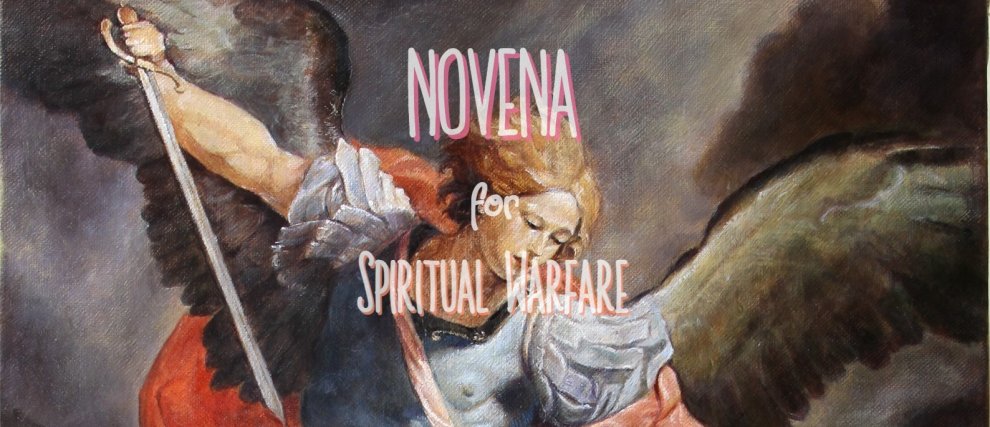What is a "Spiritual Battle"?
The website of the website of the Catholic Church in France defines spiritual battle as follows: “Refers to the effort of man to remove, helped by divine grace, the obstacles that come from his limits, his refusals and which oppose God. This battle is intimate, because it is located in the soul and the heart torn between what we really are and what we perceive as best for a greater, deeper spiritual life. Through spiritual battle, man learns to overcome his inner divisions to allow himself to be inhabited by the peace of God. Its main support is prayer.”
What does the Catechism of the Catholic Church say? Discover the main questions and answers around spiritual battle with Hozana. At the end of this reading, we invite you to discover other great questions of faith.
What does spiritual battle mean?
Spiritual battle is inherent to Christian life, numbers 405 and 409 of the Catechism remind us.
“Baptism, by imparting the life of Christ's grace, erases original sin and turns a man back towards God, but the consequences for nature, weakened and inclined to evil, persist in man and summon him to spiritual battle.” (No. 405).
“The whole of man's history has been the story of dour combat with the powers of evil, stretching, so our Lord tells us, from the very dawn of history until the last day. Finding himself in the midst of the battlefield man has to struggle to do what is right, and it is at great cost to himself, and aided by God's grace, that he succeeds in achieving his own inner integrity.” (No. 409).
The fight does not spare the Church, number 672 also shows us: “According to the Lord, the present time is the time of the Spirit and of witness, but also a time still marked by “distress” and the trial of evil which does not spare the Church and ushers in the struggles of the last days. It is a time of waiting and watching.” (No. 672).
In addition, despite baptism, we still have to fight, numbers 978 and 1426 of the Catechism remind us: “Yet the grace of Baptism delivers no one from all the weakness of nature. On the contrary, we must still combat the movements of concupiscence that never cease leading us into evil.” (No. 978).
“Nevertheless the new life received in Christian initiation has not abolished the frailty and weakness of human nature, nor the inclination to sin that tradition calls concupiscence, which remains in the baptized such that with the help of the grace of Christ they may prove themselves in the struggle of Christian life. This is the struggle of conversion directed toward holiness and eternal life to which the Lord never ceases to call us. ” (No. 1426).
Finally, the number 2015 shows that holiness comes through spiritual battle: “The way of perfection passes by way of the Cross. There is no holiness without renunciation and spiritual battle. Spiritual progress entails the ascesis and mortification that gradually lead to living in the peace and joy of the Beatitudes” (No. 2015).
What are the places of spiritual battle?
God
The first place of spiritual battle is our relationship with God, our ability to listen to His Word and to put it into practice: concretely in our daily life, how do we glorify the Lord? How do we implement God's two greatest commandments “Love the Lord your God with all your heart and with all your soul and with all your mind” and “Love your neighbor as yourself”?
Prayer
Numbers 2725 to 2728 show us that prayer is a place of spiritual battle.
Two other numbers also provide a good summary of the first three.
The first, number 2752, tells us: “Prayer presupposes an effort, a fight against ourselves and the wiles of the Tempter. The battle of prayer is inseparable from the necessary “spiritual battle” to act habitually according to the Spirit of Christ: we pray as we live, because we live as we pray. ” (No. 2752).
The second, number 2753 says: “In the battle of prayer we must confront erroneous conceptions of prayer, various currents of thought, and our own experience of failure. We must respond with humility, trust, and perseverance to these temptations which cast doubt on the usefulness or even the possibility of prayer. ” (No. 2753).
Finally, number 2754 warns us about distraction and drought, which are difficulties relating to prayer.
The forces of evil
The forces of evil or the powers of death are another place of spiritual battle. It can be any activity that is incompatible with the Christian faith, and which leads us on a path of perdition. As we saw in our article on Satan, this can concern all forms of divination.
The flesh
Numbers 2516 and 2846 show us the struggle between the spirit and the flesh: “there already exists a certain tension in him; a certain struggle of tendencies between “spirit” and “flesh” develops. But in fact this struggle belongs to the heritage of sin. It is a consequence of sin and at the same time a confirmation of it. It is part of the daily experience of the spiritual battle.” (No. 2516). For Saint Paul, the flesh refers to the tendency of man to live selfishly (both with his soul and his body) by resorting to his own forces, without the help of the Holy Spirit, hence the battle between the spirit and the flesh.
Lust
As we have seen previously, lust is the inclination to evil and sin (Nos. 405 and 1264). In addition, number 2515 adds that “St. John distinguishes three kinds of covetousness or concupiscence: lust of the flesh, lust of the eyes, and pride of life. In the Catholic catechetical tradition, the ninth commandment forbids carnal concupiscence; the tenth forbids coveting another's goods.” (No. 2514).
Purity
The numbers 2520 to 2533 deal with the fight for purity. Number 2520 mentions that “the baptized must continue to struggle against concupiscence of the flesh and disordered desires. ” (No. 2520). In addition, the baptized are invited in particular to the purity of intention which consists of finding and fulfilling the will of God, and to the purity of the external and internal gaze.
What aids us in spiritual battle?
Prayer
Insofar as number 2725 of the Catechism mentions that the “spiritual battle” of the new life of the Christian is inseparable from the battle of prayer”, an effective aid in battle is prayer. Number 2612 emphasizes that “only by keeping watch in prayer can one avoid falling into temptation” (No. 2612). In addition, number 2098 always invites us to persevere in prayer: “... they should always pray and not give up.” (Luke 18:1).
To go further in prayer, we invite you to consult our guide.
The Word of God
Word of power and fertility, and bringing us to commune with Christ himself, the Word of God is an aid in spiritual battle. It gives us strength, power and consolation. It helps us build our lives on solid rock. The Second Vatican Council, in the Constitution Dei Verbum, recalls the central place of the Bible in the life of the Church.
Conversion
Conversion is another aid in battle, especially that of prayer, number 2754 mentions. As we have seen previously, conversion is a “struggle for holiness and eternal life” (No. 1426).
Vigilance
Vigilance is particularly discussed in numbers 2754 to 2849. The first speaks of “vigilance of the heart”, while the second reminds us that it is “custody of the heart” and that it is highlighted emphatically in the word of God: “Vigilance is “custody of the heart,” and Jesus prayed for us to the Father: “Keep them in your name.” The Holy Spirit constantly seeks to awaken us to keep watch. Finally, this petition takes on all its dramatic meaning in relation to the last temptation of our earthly battle; it asks for final perseverance. “Lo, I am coming like a thief! Blessed is he who is awake. ” (No. 2849).
The Theological Virtues
The Catechism, in number 1820, shows that faith, charity, and especially hope (which are the theological virtues), are weapons that protect us in battle: “Hope is the “sure and steadfast anchor of the soul . . . that enters . . . where Jesus has gone as a forerunner on our behalf.” Hope is also a weapon that protects us in the struggle of salvation: “Let us . . . put on the breastplate of faith and charity, and for a helmet the hope of salvation.” It affords us joy even under trial: “Rejoice in your hope, be patient in tribulation.” Hope is expressed and nourished in prayer, especially in the Our Father, the summary of everything that hope leads us to desire.” (no. 1820) ” (No. 1820).
Perseverance in faith
“Faith is an entirely free gift that God makes to man. We can lose this priceless gift, as St. Paul indicated to St. Timothy: “Wage the good warfare, holding faith and a good conscience. By rejecting conscience, certain persons have made shipwreck of their faith.” To live, grow and persevere in the faith until the end we must nourish it with the word of God; we must beg the Lord to increase our faith; it must be “working through charity,” abounding in hope, and rooted in the faith of the Church. ” (No. 162).
Let us pray to be rooted in Christ with Hozana!
With Hozana, let us pray to be rooted in Christ, whether in the word of God, prayer, in the practice of the virtues, in the Eucharist and the sacraments. We also ask for vigilance and perseverance. That way, we will be perfectly armed in spiritual battle.
Hozana offers different communities to continue your pilgrimage to holiness, such as and communal retreats.

